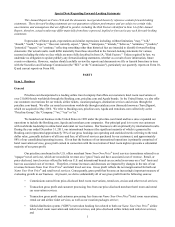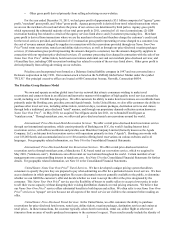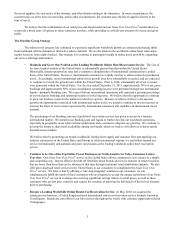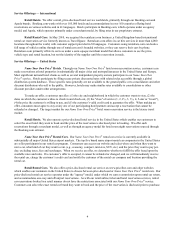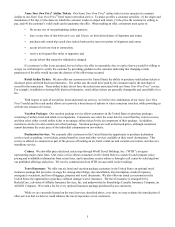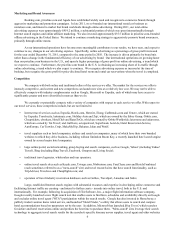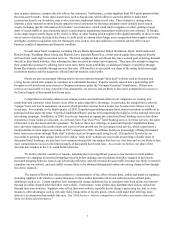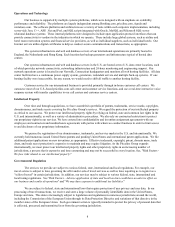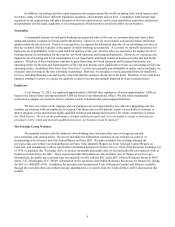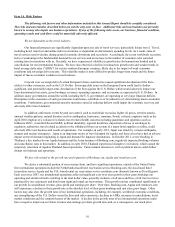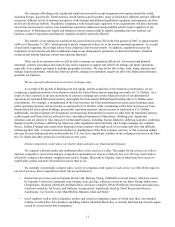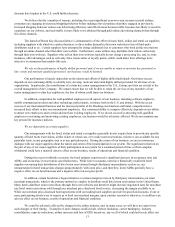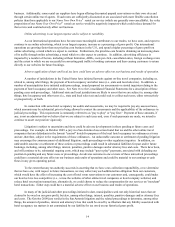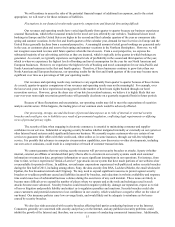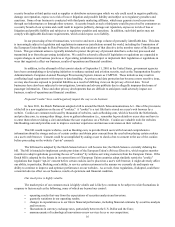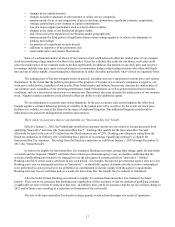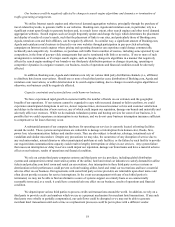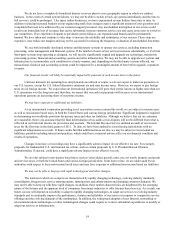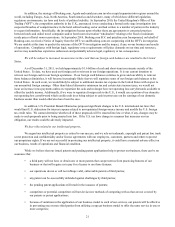Priceline 2011 Annual Report Download - page 12
Download and view the complete annual report
Please find page 12 of the 2011 Priceline annual report below. You can navigate through the pages in the report by either clicking on the pages listed below, or by using the keyword search tool below to find specific information within the annual report.11
The strategy of Booking.com, Agoda and rentalcars.com involves rapid expansion into regions around the world,
including Europe, Asia-Pacific, North America, South America and elsewhere, many of which have different customs, different
currencies, different levels of customer acceptance of the Internet and different legislation, regulatory environments, tax laws
and levels of political stability. In addition, compliance with foreign legal, regulatory or tax requirements will place demands
on our time and resources, and we may nonetheless experience unforeseen and potentially adverse legal, regulatory or tax
consequences. If Booking.com, Agoda and rentalcars.com are unsuccessful in rapidly expanding into new markets, our
business, results of operations and financial condition would be adversely affected.
The number of our employees worldwide has grown from less than 700 in the first quarter of 2007, to approximately
5,000 as of December 31, 2011, which growth is mostly comprised of hires by or for our international operations. As a result
of such rapid expansion, the average tenure of our employees has become shorter. In addition, expansion increases the
complexity of our business and places additional strain on our management, operations, technical performance, financial
resources and internal financial control and reporting functions.
There can be no assurance that we will be able to manage our expansion effectively. Our current and planned
personnel, systems, procedures and controls may not be adequate to support and effectively manage our future operations,
especially as we employ personnel in multiple geographic locations. We may not be able to hire, train, retain, motivate and
manage required personnel, which may limit our growth, damage our reputation, negatively affect our financial performance,
and harm our business.
We are exposed to fluctuations in currency exchange rates.
As a result of the growth of Booking.com and Agoda, and the acquisition of the rentalcars.com business, we are
conducting a significant portion of our business outside the United States and are reporting our results in U.S. Dollars. As a
result, we face exposure to adverse movements in currency exchange rates as the financial results of our international
operations are translated from local currency (principally the Euro and the British Pound Sterling) into U.S. Dollars upon
consolidation. For example, a strengthening of the Euro increases our Euro-denominated net assets, gross bookings, gross
profit, operating expenses, and net income as expressed in U.S. Dollars, while a weakening of the Euro decreases our Euro-
denominated net assets, gross bookings, gross profit, operating expenses, and net income as expressed in U.S. Dollars.
Additionally, foreign exchange rate fluctuations on transactions denominated in currencies other than the functional currency
result in gains and losses that are reflected in the Consolidated Statements of Operations. Booking.com, Agoda and
rentalcars.com are subject to risks typical of international business, including, but not limited to, differing economic conditions,
changes in political climate, differing tax structures, other regulations and restrictions, and foreign exchange rate volatility.
Greece, Ireland, Portugal and certain other European Union countries with high levels of sovereign debt have had difficulty
refinancing their debt. Concern around devaluation or abandonment of the Euro common currency, or that sovereign default
risk may be more widespread and could include the U.S., has led to significant volatility in the exchange rate between the Euro,
the U.S. dollar and other currencies over the past several years.
Intense competition could reduce our market share and harm our financial performance.
We compete with both online and traditional sellers of the services we offer. The market for the services we offer is
intensely competitive, and current and new competitors can launch new sites at a relatively low cost. We may not be able to
effectively compete with industry conglomerates such as Google, Microsoft or Expedia, each of which may have access to
significantly greater and more diversified resources than we do.
We currently or potentially compete with a variety of companies with respect to each service we offer. With respect to
our travel services, these competitors include, but are not limited to:
• Internet travel services such as Expedia, Hotels.com, Hotwire, Elong, CarRentals.com and Venere, which are owned
by Expedia; Travelocity, lastminute.com, Holiday Auto and Zuji, which are owned by the Sabre Group; Orbitz.com,
Cheaptickets, ebookers, HotelClub and RatesToGo, which are owned by Orbitz Worldwide; laterooms and asiarooms,
which are owned by Tui Travel; and Gullivers, octopustravel, Superbreak, hotel.de, Hotel Reservation Service,
AutoEurope, Car Trawler, Ctrip, MakeMyTrip, Rakuten, Jalan and Wotif;
• travel suppliers such as hotel companies, airlines and rental car companies, many of which have their own branded
websites to which they drive business, including without limitation Room Key, a recently launched hotel search engine
owned by several major hotel companies;


